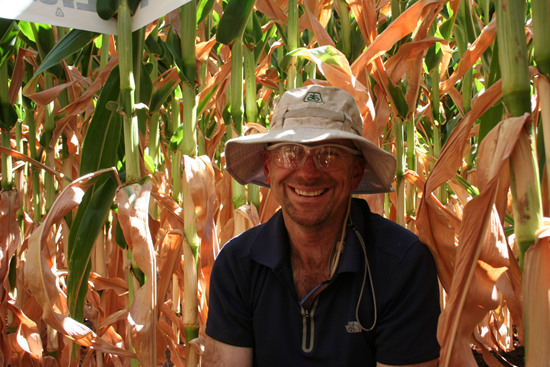

 |
| Professor Mark Cooper |
With an increasing global population, problems including global warming, grain yield and drought have become important subjects for global agricultural experts. “It’s no secret that the world needs to produce significantly more food to support its growing population, the challenge is how to do it and make sure it is available in the right places at the right times,” Professor Cooper recently told People's Daily Online. His interest in genetics and evolution and his experience growing wheat and barley in Scotland, his home country, inspired his long-term enthusiasm in global food safety.
Professor Cooper completed his Bachelor of Agricultural Science and Ph.D. in Quantitative Genetics at the University of Queensland. After graduation, he became a lecturer at the School of Agriculture and Food Sciences at the University of Queensland, staying in this role for 10 years, going on to work at DuPont Pioneer in the US for nearly 20 years. As a global leader in quantitative genetics and plant breeding, Professor Cooper is committed to finding new strategies for genetic crop improvement and combining such genetic improvement with agricultural practices.
Throughout his career, Professor Cooper has led the development of new genetic modeling methods through continuous research and training based on genetic networks. To date, he has received a number of significant awards, including several from DuPont Pioneer and the Thomson ISI fast breaking paper award. While at DuPont Pioneer, he also researched drought adaptation and participated in the AQUAmax drought-adapted maize hybrids project. The project is now one of the largest plant breeding programs on the planet, with a breeding area spanning millions of hectares of land.
In March 2018, Professor Cooper returned to the University of Queensland to join the Queensland Alliance for Agriculture and Innovation as the Chair in Prediction Based Crop Improvement. “One of the important things for the long term is to train people for the future, and the university is a great place to do that training. I think the University of Queensland is an advanced research institution and has a very strong global outlook. It is an exciting place to be.”
Professor Cooper explained that he traveled the world to understand the diversity of different continents. “I have visited China once. That was in 1993 when I came to the 8th International Wheat Genetics Symposium that was held in Beijing,” he said.
“It is terrific to visit the people in the genetics community in their actual environment. Then, for example, to see the Chinese Academy of science has done some of the work. At that time, what I saw was a country that had started to invest in building up the central structure for training and for research that supports future innovation of agriculture.”
Professor Cooper had many opportunities to work with Chinese colleagues after DuPont Pioneer came to China. The most impressive project that Professor Cooper worked on with Chinese researchers was a large project for agricultural production, where the researchers used advanced professional and mathematical modeling to create agricultural data and special modeling methods that generated many global datasets. This research discovered new genes which determine the growth of crops in different environments and has since improved the rice yield and the hybrid maize varieties.
Talking about his experience of working with Chinese researchers, Professor Cooper said, “They have a strong commitment to outstanding work, diligence to do challenging things and work very hard to solve problems when other people seem to give up.”
In recent years, Professor Cooper has been watching the development of agriculture in China closely. “Being a large research community, China has made many fascinating discoveries. Particularly, in this area of prediction agriculture, where many people are looking at ways of capturing a large amount of data, managing that data and attempting to discover a new pattern in this dataset using science technology.”
“We discussed the process while trying to build the prediction agriculture capability at the University of Queensland. That is another clear project that requires a global connection. From my perspective, all of those opportunities should include China if possible.”
Professor Cooper believes that the development of agricultural science is very much related to collaboration between countries. By sharing future talents, agricultural research can be further enhanced, and more development opportunities will arise. (People’s Daily Online/ Jin Xie)
 Fire brigade in Shanghai holds group wedding
Fire brigade in Shanghai holds group wedding Tourists enjoy ice sculptures in Datan Town, north China
Tourists enjoy ice sculptures in Datan Town, north China Sunset scenery of Dayan Pagoda in Xi'an
Sunset scenery of Dayan Pagoda in Xi'an Tourists have fun at scenic spot in Nanlong Town, NW China
Tourists have fun at scenic spot in Nanlong Town, NW China Harbin attracts tourists by making best use of ice in winter
Harbin attracts tourists by making best use of ice in winter In pics: FIS Alpine Ski Women's World Cup Slalom
In pics: FIS Alpine Ski Women's World Cup Slalom Black-necked cranes rest at reservoir in Lhunzhub County, Lhasa
Black-necked cranes rest at reservoir in Lhunzhub County, Lhasa China's FAST telescope will be available to foreign scientists in April
China's FAST telescope will be available to foreign scientists in April "She power" plays indispensable role in poverty alleviation
"She power" plays indispensable role in poverty alleviation Top 10 world news events of People's Daily in 2020
Top 10 world news events of People's Daily in 2020 Top 10 China news events of People's Daily in 2020
Top 10 China news events of People's Daily in 2020 Top 10 media buzzwords of 2020
Top 10 media buzzwords of 2020 Year-ender:10 major tourism stories of 2020
Year-ender:10 major tourism stories of 2020 No interference in Venezuelan issues
No interference in Venezuelan issues
 Biz prepares for trade spat
Biz prepares for trade spat
 Broadcasting Continent
Broadcasting Continent Australia wins Chinese CEOs as US loses
Australia wins Chinese CEOs as US loses